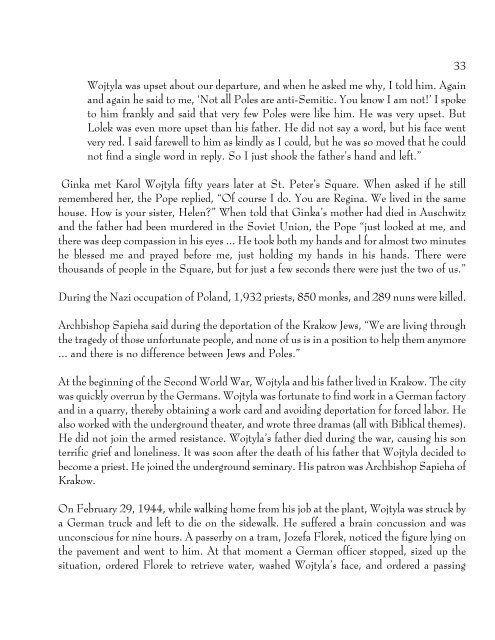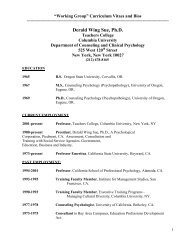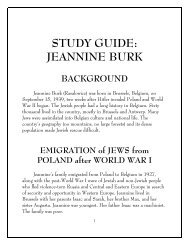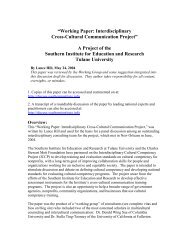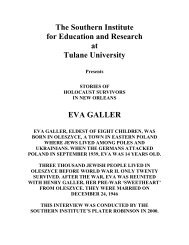teaching the holocaust 2004 summer workshop - Southern Institute ...
teaching the holocaust 2004 summer workshop - Southern Institute ...
teaching the holocaust 2004 summer workshop - Southern Institute ...
You also want an ePaper? Increase the reach of your titles
YUMPU automatically turns print PDFs into web optimized ePapers that Google loves.
Wojtyla was upset about our departure, and when he asked me why, I told him. Again<br />
and again he said to me, ‘Not all Poles are anti-Semitic. You know I am not!’ I spoke<br />
to him frankly and said that very few Poles were like him. He was very upset. But<br />
Lolek was even more upset than his fa<strong>the</strong>r. He did not say a word, but his face went<br />
very red. I said farewell to him as kindly as I could, but he was so moved that he could<br />
not find a single word in reply. So I just shook <strong>the</strong> fa<strong>the</strong>r’s hand and left.”<br />
Ginka met Karol Wojtyla fifty years later at St. Peter’s Square. When asked if he still<br />
remembered her, <strong>the</strong> Pope replied, “Of course I do. You are Regina. We lived in <strong>the</strong> same<br />
house. How is your sister, Helen?” When told that Ginka’s mo<strong>the</strong>r had died in Auschwitz<br />
and <strong>the</strong> fa<strong>the</strong>r had been murdered in <strong>the</strong> Soviet Union, <strong>the</strong> Pope “just looked at me, and<br />
<strong>the</strong>re was deep compassion in his eyes ... He took both my hands and for almost two minutes<br />
he blessed me and prayed before me, just holding my hands in his hands. There were<br />
thousands of people in <strong>the</strong> Square, but for just a few seconds <strong>the</strong>re were just <strong>the</strong> two of us.”<br />
During <strong>the</strong> Nazi occupation of Poland, 1,932 priests, 850 monks, and 289 nuns were killed.<br />
Archbishop Sapieha said during <strong>the</strong> deportation of <strong>the</strong> Krakow Jews, “We are living through<br />
<strong>the</strong> tragedy of those unfortunate people, and none of us is in a position to help <strong>the</strong>m anymore<br />
... and <strong>the</strong>re is no difference between Jews and Poles.”<br />
At <strong>the</strong> beginning of <strong>the</strong> Second World War, Wojtyla and his fa<strong>the</strong>r lived in Krakow. The city<br />
was quickly overrun by <strong>the</strong> Germans. Wojtyla was fortunate to find work in a German factory<br />
and in a quarry, <strong>the</strong>reby obtaining a work card and avoiding deportation for forced labor. He<br />
also worked with <strong>the</strong> underground <strong>the</strong>ater, and wrote three dramas (all with Biblical <strong>the</strong>mes).<br />
He did not join <strong>the</strong> armed resistance. Wojtyla’s fa<strong>the</strong>r died during <strong>the</strong> war, causing his son<br />
terrific grief and loneliness. It was soon after <strong>the</strong> death of his fa<strong>the</strong>r that Wojtyla decided to<br />
become a priest. He joined <strong>the</strong> underground seminary. His patron was Archbishop Sapieha of<br />
Krakow.<br />
On February 29, 1944, while walking home from his job at <strong>the</strong> plant, Wojtyla was struck by<br />
a German truck and left to die on <strong>the</strong> sidewalk. He suffered a brain concussion and was<br />
unconscious for nine hours. A passerby on a tram, Jozefa Florek, noticed <strong>the</strong> figure lying on<br />
<strong>the</strong> pavement and went to him. At that moment a German officer stopped, sized up <strong>the</strong><br />
situation, ordered Florek to retrieve water, washed Wojtyla’s face, and ordered a passing<br />
33


